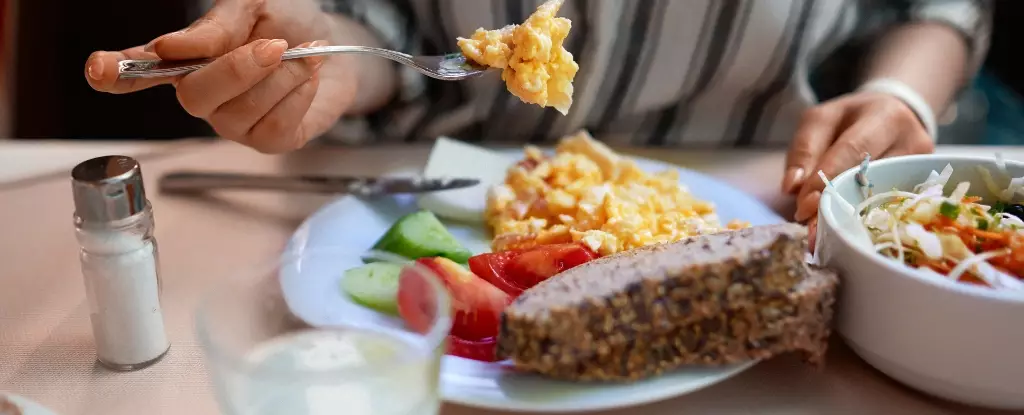In the realm of weight loss, medications such as semaglutide—commonly found in brands like Ozempic and Wegovy—have gained immense popularity due to their substantial results. However, public opinion reveals that a significant portion of the population favors natural methods over pharmaceutical interventions. This sentiment signals a growing hunger for understanding how nutrition can replicate the beneficial effects of these drugs without the accompanying risks or side effects. New research illuminates a fascinating truth: the right dietary choices can effectively enhance weight loss pathways that pharmaceutical drugs target.
Deciphering the GLP-1 Connection
One of the key players in this nutritional narrative is a hormone known as glucagon-like peptide-1 (GLP-1). This hormone acts as a satiety signal, promoting the sensation of fullness, which helps mitigate overeating—a notable concern in our calorie-dense society. Medications like Ozempic and Wegovy increase GLP-1 levels dramatically, leading to sustained feelings of fullness and significantly reduced food intake. Interestingly, certain natural nutrients can similarly stimulate the production of GLP-1, presenting a compelling argument for dietary approaches.
What’s particularly exciting is the role of dietary fiber and healthy fats. Foods abundant in fiber, such as beans, whole grains, and various fruits, help ferment beneficial bacteria in the gut, resulting in the production of short-chain fatty acids that boost GLP-1 levels. In contrast, the inclusion of monounsaturated fats found in olive oil and avocados can enhance satiety signaling as well. These findings encourage a diverse approach where healthy eating becomes a practical, everyday endeavor, rather than merely adhering to restrictive diets.
The Impact of Eating Practices
While the types of food we consume are pivotal, the manner in which we eat is equally influential. Recent studies reveal that the sequence in which we consume our meals can significantly affect GLP-1 levels. For instance, enjoying a protein-rich course, such as fish or chicken, before indulging in carbohydrates elevates GLP-1 production more effectively than the reverse order. Notably, vegetables consumed prior to carbohydrates also yield similar benefits, underlining the importance of meal composition in influencing our hormonal responses.
Additionally, meal timing plays an essential role in this equation. Circadian rhythms dictate hormonal fluctuations throughout the day, suggesting that eating in accordance with our biological clocks can have profound effects on our metabolism. Breakfast, often regarded as the most important meal, emerges as particularly pivotal, as studies demonstrate that consuming a larger breakfast promotes effective GLP-1 release, in contrast to a more modest evening meal.
Moreover, eating speed and mindfulness cannot be overlooked. Slow eating has been consistently linked to heightened GLP-1 levels, as it allows time for the body to signal fullness rather than overwhelming the digestive system. Gentle reminders to chew thoroughly transform meals into a more mindful practice, fostering improved nutrient absorption and satisfaction.
Nutrition vs. Medications: The Long-Term Perspective
Despite the potential of food-based strategies in elevating GLP-1 production, it is essential to acknowledge that the impacts of dietary adjustments typically fall short of the effects achieved through medications. For context, dietary interventions might peak at a GLP-1 level of around 59 picograms per milliliter, whereas Ozempic can elevate these numbers to over 65 nanograms—you can see the vast chasm that separates the two approaches.
However, the remarkable balance between rapid results and overall health outcomes raises thought-provoking questions. The Mediterranean diet, known for its heart-health benefits, demonstrates a 30% reduction in cardiac events, overshadowing the 20% reduction attributed to GLP-1 medications. This revelation advocates for a mindset shift: while medications may expedite weight loss, a focus on harmonious, long-term nutritional practices yields dividends not only in weight management but also in overall health preservation.
Practical Steps Towards Natural Weight Management
For those desiring a drug-free approach to weight loss, integrating specific strategies into daily life may prove transformative. First and foremost, prioritize a hearty breakfast, establishing it as a cornerstone of your daily intake. Striving for at least one fiber-rich item in every meal can create a satisfying foundation for your diet, while monounsaturated fats should become a staple—think olive oil drizzled over vegetables or avocado spread on whole-grain bread.
Being mindful of the sequence in which you consume various foods is paramount. Aim to establish a habit of starting meals with proteins and vegetables, followed by carbohydrates. Incorporate slow-eating practices during mealtimes, allowing for greater awareness of fullness cues. Finally, don’t underestimate the power of nut-based snacks, as they not only provide essential nutrients but also promote feelings of satiety.
Embarking on a natural weight loss journey invites individuals to reassess their relationship with food. Through understanding and implementing these dietary practices, one can foster not just weight loss but a sustainable and healthy lifestyle, liberated from the constraints of medication.


Leave a Reply